Year 6 Exam > Year 6 Notes > Year 6 Computing > Decomposition
Decomposition | Year 6 Computing PDF Download
What does decomposition mean?
Decomposition refers to the process of breaking down a complex problem or task into smaller, more manageable parts. This concept is utilized across various fields to simplify challenges and enhance problem-solving.
- Science: In science, decomposition occurs when a substance breaks down and decays over time, revealing its constituent elements.
- Mathematics: In mathematics, decomposition involves partitioning numbers and intricate calculations into simpler components to facilitate solving complex numerical problems.
- Design Technology: Within design technology, decomposition is employed to deconstruct a project into a series of smaller and more achievable tasks.
- Computing: In computing, decomposition is used to break down a computing task into a series of steps or an algorithm, making it easier to understand and implement.
Decomposition is not limited to academic settings but is a valuable skill in everyday life. It can aid in organizing tasks like planning family meals, arranging events such as birthday parties, and tackling homework effectively.
Using decomposition for complicated projects
- Decomposition involves breaking down complex projects or tasks into smaller, more manageable parts.
- By dividing a large task into smaller tasks, it becomes easier to understand what needs to be done.
- These smaller tasks can be distributed among a team, allowing different individuals to work on various parts of the problem and then merge their solutions to complete the project collaboratively.
Designing a computer game
- Creating a computer game is a complex undertaking.
- There are numerous considerations, designs, and plans involved.
- Game designers employ decomposition to break down the process into smaller components.
- The initial step is to compile a list of the primary components of the computer game.
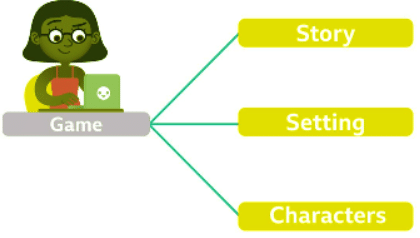
Story
We need to plan the narrative.
- What is our game about?
- Where do the players start?
- What is their mission in the game?
- How do they win or lose?
- What is the end goal?
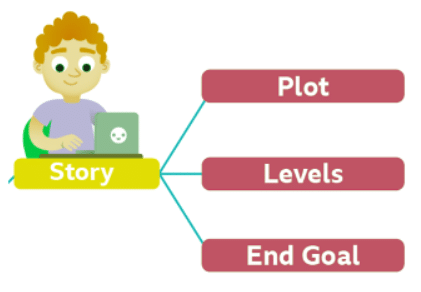
Setting
- Where is the game set?
- The game can be set in various locations, such as a castle overrun by fire-breathing dragons or a high-speed racing environment where players collect points along the way.
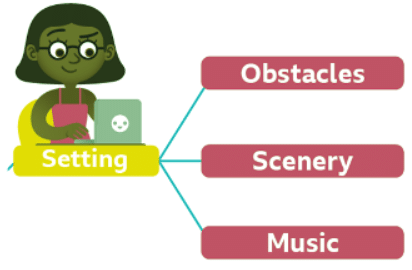
Characters
- Who is in the game?
- What powers do they have?
- What are their quests and missions?
- What actions can they perform?
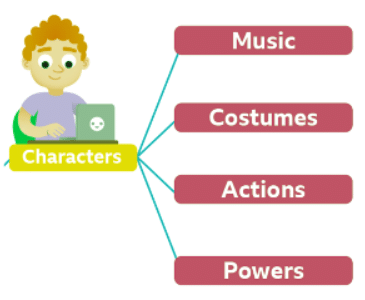
Question for DecompositionTry yourself: What is the purpose of decomposition in problem-solving?View Solution
Breaking Down Game Design into Smaller Parts
- After breaking down the game and considering each smaller part, game designers may further decompose each component.
- For instance, in designing the game setting, they would need to address background graphics, music, and sound effects.
- Similarly, for each character, considerations include hair color, costumes, accessories, and movement animations.
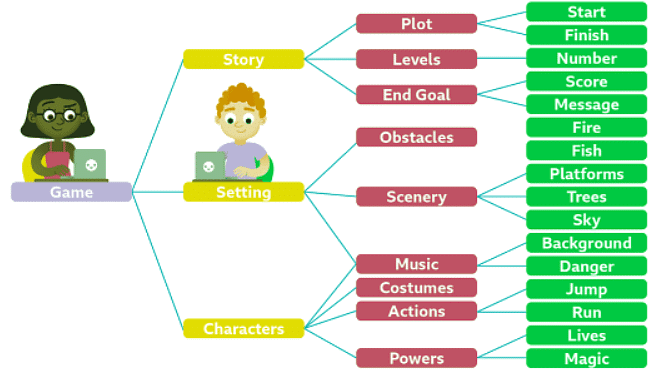
Working with Different Teams and Groups
- When working on a project involving different teams and groups, it is essential to break down the entire project into smaller, manageable parts. Each of these smaller parts can then be addressed individually.
- The code for each section can also be divided and developed separately.
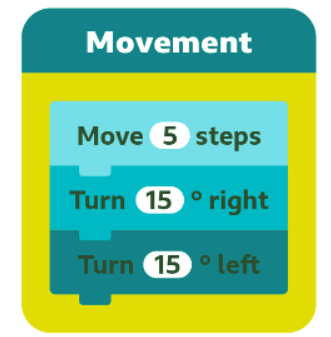
- During the development process, game designers may delegate certain tasks to external teams or specialized companies, such as graphic designers or music composers.
- Once all the individual components are completed, they can be integrated to create the final computer game.
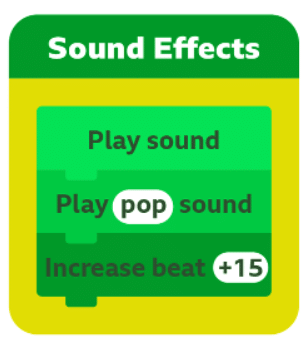
Breaking Down Complex Real-World Systems
- Consider the intricacies of managing traffic flow in a bustling city as a large and intricate problem. To ensure smooth traffic movement, numerous interconnected devices and systems must work in harmony:

- Road signs
- Traffic lights
- Cameras
- Speed cameras
- Crossing lights
- The computer systems and software responsible for managing these devices are highly intricate, adapting to the ever-changing traffic conditions.
The computer systems and programs that manage these devices are highly intricate and must handle constantly shifting conditions. - The task is too extensive for a single system or program to manage alone.
- Without breaking down these complex parts into smaller, more manageable sections, it would be impossible to prevent traffic jams entirely.
- Each small section of the system is handled independently by various devices, programs, and teams of people.
- All these different parts are interconnected into networks that can communicate with each other and collaborate to maintain smooth traffic flow.
Question for DecompositionTry yourself: How can game designers manage the complexity of developing a computer game involving different teams and groups?View Solution
The document Decomposition | Year 6 Computing is a part of the Year 6 Course Year 6 Computing.
All you need of Year 6 at this link: Year 6
|
19 videos|26 docs|3 tests
|
FAQs on Decomposition - Year 6 Computing
| 1. What does decomposition mean in the context of designing a computer game? |  |
Ans. Decomposition in the context of designing a computer game refers to breaking down the overall game design into smaller parts or components to make it more manageable and easier to work on.
| 2. How can decomposition be used for complicated projects in the field of game design? |  |
Ans. Decomposition can be used for complicated projects in game design by breaking them down into smaller, more manageable tasks or components, allowing different teams or groups to work on each part independently.
| 3. How can decomposition help in working with different teams and groups in game development? |  |
Ans. Decomposition can help in working with different teams and groups in game development by clearly defining and assigning specific tasks or components to each team or group, ensuring that everyone knows their role and responsibilities.
| 4. What are some benefits of breaking down complex real-world systems through decomposition? |  |
Ans. Breaking down complex real-world systems through decomposition can help in identifying and understanding the individual components or processes that make up the system, making it easier to analyze, optimize, and improve overall efficiency.
| 5. How do UK schools incorporate decomposition into their curriculum to teach students about complex systems? |  |
Ans. UK schools incorporate decomposition into their curriculum by teaching students how to break down complex systems into smaller parts or components, helping them understand the interconnectedness and interactions within the system.
Related Searches





















